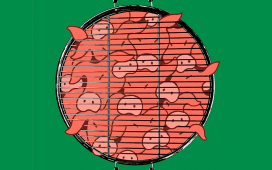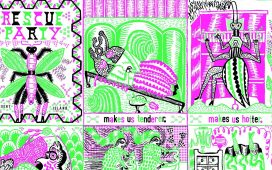The other day, on one of those transit-soured Saturdays now so common in New York, I showed up late to the theatre. When I asked the public-relations representative for my tickets, she looked stricken. “Vinson Cunningham?” she said. “I—I’ve already signed you in.” There was someone in my seat, and he’d used my name to get there. I spent the first act of the show in a makeshift seat behind the orchestra, fighting back distraction. Who was this person? How had he known that there were tickets in my name for this show, on this afternoon? By intermission, I’d worked myself up into a kind of panicked anger. I walked to the seat that should have been mine, and sitting there was, indeed, a guy who looked just enough like me to spook me even more than I’d already been spooked. Like me, he wore glasses, had rounded features a tick too big for his face, and maintained an empty-lot beard. We had a quick, heated, unsatisfying exchange during which he admitted nothing and I said nothing as memorable or macho as I’d hoped to say. But, shortly after I’d retreated, the man and his guest looked around, got up, and quickly left the theatre.
A few days later, with this inexplicable second self still on my mind, I saw “A Strange Loop,” a musical written and composed by Michael R. Jackson and directed by Stephen Brackett (produced in association with Page 73, at Playwrights Horizons). The show’s protagonist, Usher (Larry Owens)—like his creator—shares a name with a famous pop singer. To double the doubling, Usher works as an usher at “The Lion King” on Broadway.
Usher is an artist who is “obsessing,” he sings, toward the end of a mordantly thorough catalogue of the identifiers that apply to him—“young overweight-to-obese homosexual and/or gay and/or queer, cisgender male, able-bodied university-and-graduate-school-educated,” and on and on—over “the latest draft of his self-referential musical,” which is, of course, called “A Strange Loop.”
To watch this show is to enter, by some urgent, bawdy magic, an ecstatic and infinitely more colorful version of the famous surreal lithograph by M. C. Escher: the hand that lifts from the page, becoming almost real, then draws another hand, which returns the favor. Which came first? “A Strange Loop” takes its title from a concept pioneered by Douglas Hofstadter, the cognitive- science professor who wrote the book “Gödel, Escher, Bach: An Eternal Golden Braid” and, later, the more focussed study “I Am a Strange Loop”; both were premised upon the impossibly complex, hopelessly circular means by which each of us composes a self, an “I.”
Appropriately, the only other characters in the show are Usher’s “Thoughts,” six hilarious, hyper-verbal, endlessly cruel archetypical shape-shifters. One moment, they’re abstract entities—self-loathing, sexual ambivalence, financial mishandling. The next, they take on the shapes of Usher’s religious mother and father, who would like him to write a nice gospel play and, oh, while he’s at it, cut out the “homosexsh’alities” and stop embarrassing them with his profane music, which their fellow-congregants have started to discover.
That funny, slightly stereotypical grammatical quirk of Usher’s folks—“homosexualities”—is illustrative of Jackson’s keen ear for spoken language, and of how syntax is one sign of the growing split between Usher and the culture that raised him, but also of “A Strange Loop” ’s formal multiplicity. It’s always dealing with plurals: Usher is writing about Usher; Usher is living and remembering and ideating, all at once; he never gets a chance to be still, to be just one person.
Usher’s Thoughts are harsh, and their judgments—like Usher’s treatment of himself—run bleak. Jackson’s lyrical cleverness goes a long way, then, toward maintaining an unlikely levity. His songs echo the buoyant intensity of Usher’s favorite “white girl music,” especially that of Liz Phair. Just as important to the tonal mix are the performances of the Thoughts, by Antwayn Hopper, James Jackson, Jr., L Morgan Lee, John-Michael Lyles, John-Andrew Morrison, and Jason Veasey. Each of them sings beautifully—their deftly composed, painlessly executed harmonic work reminded me, at one point, of the contemporary gospel ensemble Take 6, then, at another parodic moment, of a fifties doo-wop group, and, often, of a college a-cappella group trying its hand at Tori Amos.
When, in the latter half of the show, Morrison and Veasey settle into the roles of Usher’s mother and father, a moving paradox appears. While Usher is the show’s main engine—Owens is onstage at almost every moment—and he devotes lots of verbal energy to explaining and defining and describing himself, the personalities that communicate themselves most easily are those of his parents, even as they come to us mediated by Usher’s memories and recriminations. (One of the Thoughts asks whether “depicting your family like hateful Tyler Perry cartoons is real life.” Usher’s answer: “Maybe not, but that’s what it feels like.”) One of the worst ways in which the self betrays itself is by loudly amplifying precisely those outer voices which cause it the most harm. One song starts out with an innocuous sweetness—“I just like to remind you periodically that I love you, son”—and climaxes with the injunction that “Hell is real.”
We get a glimpse of both Usher’s tormented mental life and his actual life, most effectively when they come together in a harrowing anecdote about semi-anonymous sex and the self-flagellation that follows. “Why do I do this?” he sings. “I have no boundaries!” Owens—a comedian, singer, and actor—performs Jackson’s songs with power, humor, and pathos, filling in the textual gaps in Usher’s characterization with an entire life’s worth of mannerism and style. Jackson skillfully parodies gospel music—further sharpening his critique of the religion of Usher’s parents—and Owens rolls with the musical shifts, channelling mock fire as easily as he earlier rendered high swoops and trembling low notes like Phair’s.
Speaking of gospel, Usher’s parents are obsessed with the writer-director-actor Tyler Perry, and think that Usher should model his career on Perry’s, instead of pursuing his weird art about “life.” Perry keeps showing up, a totem of an oppressively construed notion of race and faith, funnier each time he’s mentioned. Never before has Perry been so artfully symbolized; by the show’s end, he has been scraped of his cultural meanings like chicken off a bone.
Religion is something like “A Strange Loop” ’s mega-theme. You shuttle further inward when the God of outer reality seems to hate you. (One brutal number has the refrain “AIDS is God’s punishment.”) And when religion’s promise—or, sometimes, its threat—of self-control begins to curdle, a soul as ill-treated as Usher’s builds a cathedral of self-reference, kneeling over and over at an altar made of mirrors. But the self is a fearful thing, afraid of its own shadow and not naturally inclined to understand, or even see, itself. Jackson’s project, to finally isolate it and put it up onstage, is impossible, and its impossibility is its power. Brackett’s direction underscores the challenge: everybody’s always moving, and each body on offer refuses to be pinned down.
In the end, Jackson’s idea of the self is more complex, teasing, thrilling, and, ultimately, horrible than Hofstadter’s. Like a mind at its worst, “A Strange Loop” is repetitive and obsessive, and lands the audience back where it started many more times than it’s possible to count. But a greater fear, realized here through frantic motion and constant, sometimes glorious sound, is that some parts of the self might leave the loop and, finally, enter the world like a bad germ. That’s the terror of imposture: the idea that the figure in the mirror might walk off midmorning-routine, beat you to the subway, snatch your tickets to the show, and start living your life before you’ve even shown up. What it might say, or do, and to whom, is anybody’s guess. ♦








